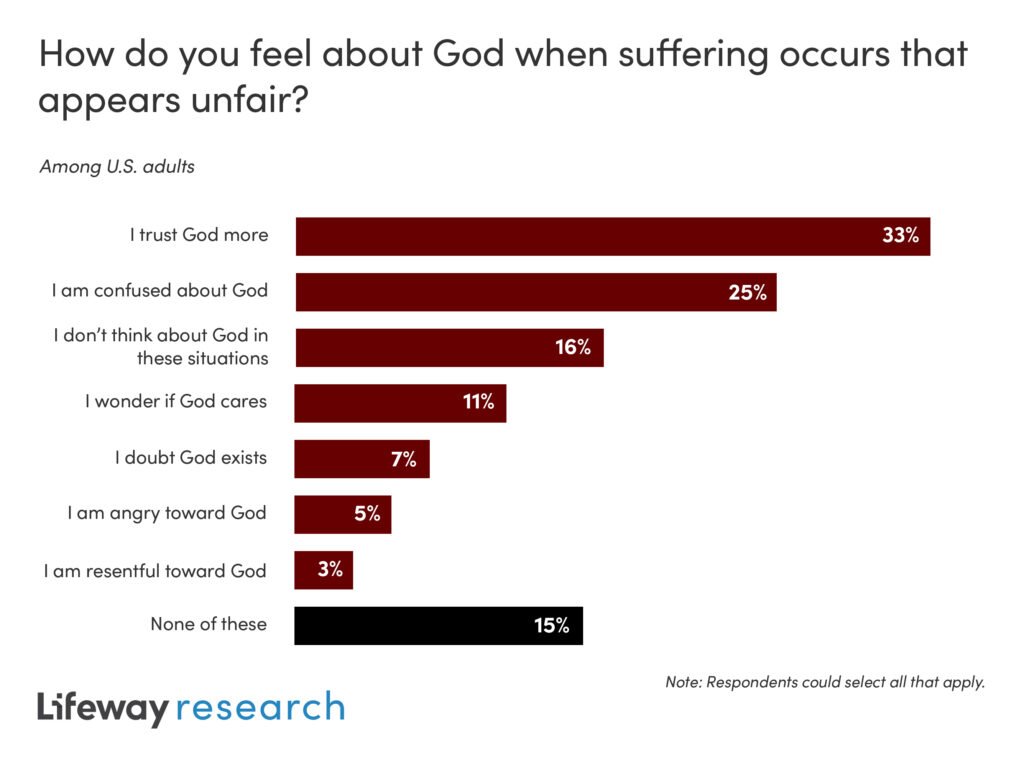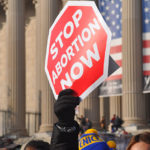
When natural disasters occur, most Americans take increased interest in God and donate to relief agencies.
By Staff
When natural disasters occur, most Americans take increased interest in God and donate to relief agencies – and they trust faith-based agencies more than their secular counterparts. A third also believe prayer can avert natural disasters.
Those are among the findings of a Lifeway Research survey conducted days after an historic EF5 tornado devastated parts of Oklahoma May 20, killing two dozen people and causing billions of dollars in damages.
According to the study, commissioned by Lifeway’s Bible Studies for Life curriculum, a third of Americans increase their trust in God during times of suffering. In response to the question, “How do you feel about God when suffering occurs that appears unfair?” the most common response is “I trust God more” (33 percent). Other responses include:
- “I am confused about God” (25 percent).
- “I don’t think about God in these situations” (16 percent).
- “I wonder if God cares” (11 percent).
- “I doubt God exists” (7 percent).
- “I am angry toward God” (5 percent).
- “I am resentful toward God” (3 percent).
“Disasters, particularly natural disasters, perplex all of us,” said Ed Stetzer, president of Lifeway Research. “While some call them ‘acts of God,’ others question why a good and loving God would do such a thing.
“The fact is, God does not give us all the answers,” Stetzer said. “But, as Christians, we believe that God gives us Himself – and that is why we have faith. Faith is believing God when you don’t have all the answers. But, disasters test that faith – some people draw closer to God, some pull away.”
Lifeway reported Southerners, frequent church attendees, and those without a college degree are likely to trust God more during disasters, while younger Americans are more likely to doubt God exists.
Nearly six in 10 Americans (57 percent) agree with the statement, “When a natural disaster occurs, my interest in God increases.” Thirty-one percent disagree and 12 percent don’t know. Nearly two-thirds of respondents living in the South agree (62 percent), compared with just over half in the West (54 percent) and Northeast (51 percent). Women, people with a college degree, and those who attend worship services once a week are also likely to be more interested in God during a disaster.
Prayer and natural disasters
Despite their increased interest in God following disasters, most Americans doubt prayer can avert natural disasters. Fifty-one percent disagree that praying can avert natural disasters, with a third (32 percent) strongly disagreeing. Still, 34 percent believe prayer can avert natural disasters. American’s in the South (40 percent) are more likely to believe than those in the Northeast (26 percent) and West (28 percent).
Thirty percent of Americans post on social media that they are praying for specific people or things. Sixty-seven percent do not post topics of prayer on social media and three percent don’t know.
Among those who do post prayers on social media, most take a moment to actually pray rather than consider the post itself a form of prayer. When asked to complete the statement, “If I post a prayer on social media …,” 23 percent say they always take a moment to actually pray and 10 percent consider posting the update to be form of prayer. Sixty-four percent complete the statement by saying they don’t post prayers.
Trusting and giving
When a natural disaster occurs, Americans trust faith-based groups to be more responsible than secular groups with their donations by nearly a two to one margin. Fifty-six percent agree they trust faith-based groups more, while 28 percent do not. Those who live in the Midwest and South, men, and those who do not have a college degree are more likely to trust faith-based charities, while those in the Northeast and Americans ages 45-64 are not as likely.
Almost 60 percent of Americans donate to relief agencies in the wake of natural disasters. Thirty percent donate to both faith-based and secular relief agencies, 15 percent donate to faith-based relief agencies only and 12 percent donate to secular relief agencies only.
A third of Americans (32 percent) don’t donate to any relief agencies.









